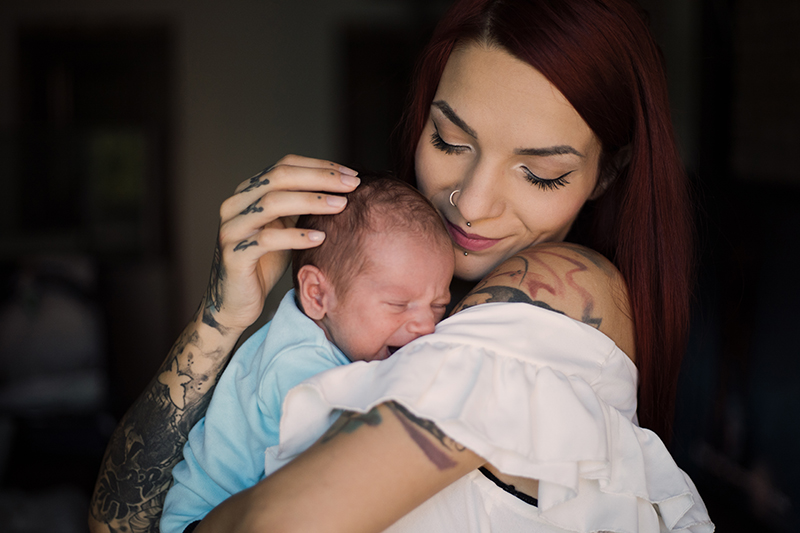What would you like to find out about today?
Seizures in babies and infants
It can be a worrying time if you think your baby is having seizures. Sometimes it is hard to tell whether a behaviour is a seizure or not. Some babies and young children have febrile seizures (or febrile convulsions). These are not epilepsy and are caused by having a high temperature.
The sections below describe some of the most common epileptic seizures that babies in different age groups can have, as well as some of the causes.
Seizures in pre-term or premature babies
The risk of seizures in babies is highest in the first year after birth and particularly within the first month of life. This is especially so for babies born early (before 37 weeks) who are vulnerable to brain injury and seizures.
The most common causes of seizures in premature babies are bleeding in the brain (haemorrhage) and infections. Babies with a low birth weight seem to be especially at risk of seizures. It isn’t always possible to find out the cause of seizures in babies.
Seizures in these very young children can be difficult to spot, as they are often subtle, with very few outward signs. But they can be more easily seen when observing a baby using an EEG (electroencephalogram), especially if they have a seizure during the test.
Seizures in newborn babies
What causes seizures in newborn babies?
- Structural causes – Being born on time but having a lack of oxygen to the brain can cause a brain injury. Some babies are born with damage to their brain for an unknown reason
- Metabolic causes – Having low levels of glucose, calcium or magnesium in the blood
- Infectious causes – Having an infection such as meningitis or encephalitis
- Genetic causes – Babies may inherit a medical condition from their parents. Sometimes a new change (mutation) in your baby’s genes can cause epilepsy. Some epilepsy syndromes have been found to have a genetic cause.
You can find out more about meningitis and encephalitis on the NHS website.
What types of seizure do newborn babies have?
- Subtle seizures – Seizures in babies might not be easy to see. Signs of seizures may include changes in breathing patterns or movements of their eyelids or lips. They might make bicycling movements with their legs, have brief jerks or episodes of stiffening their body and limbs. They might be less responsive than usual. It might be difficult to attract their attention and their eyes may not focus properly. Subtle seizures are the most common seizure types in newborn babies
- Clonic seizures – your baby may have jerking of one or both arms or legs that can have a repetitive rhythm
- Myoclonic seizures – your baby’s head or one of their arms or legs may suddenly jerk. Or both of their legs and both arms may at the same time. They may look like they have had a fright
- Tonic seizures – Your baby’s body might stiffen and may stay stiff for a while and their eyes or head might turn to one side
Seizures in infants
The possible causes of seizures in infants (ages 1 month to 1 year) are often the same as those listed above for newborn babies.
What types of seizures do infants have?
These are more varied than in newborn babies and include:
- Clonic seizures – Your baby may have jerking in one or both of their arms or legs that can have a repetitive rhythm
- Myoclonic seizures – your baby’s head or one of their arms or legs may suddenly jerk. Or both of their legs and both arms may at the same time
- Tonic seizures – your baby’s body will stiffen and their eyes or head might turn to one side
- Focal seizures – your baby will stop what they are doing and may not be aware of what is going on around them. They may stare, or move their eyes or head to one side. One side of their body might jerk, and this could change from one side to the other. The baby might go on to have a tonic-clonic (convulsive) seizure
- Infantile spasms – Your baby’s arms can fling outwards or forwards as their knees pull up and their body bends forward or extend backwards. Each spasm lasts for 1-2 seconds but they can also happen in clusters over a few minutes. Infantile spasms can be hard to spot and may look like hiccups or shoulder hunching.

Diagnosing epilepsy in newborn babies and infants
If you and your doctor think that your baby might have epilepsy, it’s important they are referred to a specialist. This should be a doctor who has specialist training in diagnosing and treating epilepsy in this age group. The specialist will ask about:
- All the different types of changes in behaviour that you see and how long they last
- Whether the seizures happen while your baby is awake or asleep, or both
- Whether they are caused by changes in your baby’s posture, or different activities
- Whether the seizures interfere with, or stop, your baby’s activities, such as feeding
You can help the specialist by recording any behaviour changes on your mobile phone.
Sometimes, the specialist will arrange for your baby to have some tests. These might include:
- Blood and urine tests. These are to check the baby’s general health, and to look for any medical conditions that might be causing their seizures. They can also be used to find out if the seizures are being caused by another medical condition. An example would be low blood sugar (glucose) or low calcium levels
- An EEG (electroencephalogram)
- An MRI (magnetic resonance imaging) scan
Epilepsy Action has more information about diagnosing epilepsy.
For more information about the recommended diagnostic process, you can read the National Institute for Health and Care Excellence (NICE) guidelines.
Support for you
Epilepsy Action offer Talk and Support groups for anyone affected by epilepsy. We have both online and face-to-face groups where you can connect with other people in a safe, relaxed environment.
Some of our online Talk & Support groups have a set theme. We have a group for parents who have a child with epilepsy.
Treatment
There is a large range of epilepsy medicines (anti-seizure medication) used to treat seizures in babies. The choice of medicine will depend on:
- The baby’s seizure type
- The age when the seizures started
- The cause of the epilepsy, if known
- Whether the baby has any other medical conditions, or takes any other medicine
- The likely outlook for their particular type of epilepsy
The ketogenic diet is sometimes prescribed by epilepsy specialists as a treatment for babies and children.
Epilepsy Action has more information about treating epilepsy.
Outlook for babies who develop epilepsy when they are less than a year old
Your baby’s specialist should be able to tell you what the outlook is for your baby. They will use all the information about your baby’s seizures, development and any other medical conditions they have to help them with this.
Some babies will continue to have seizures. Or they might stop for a while and happen again when they are older. Some babies will never have any more seizures.
What to do if your child has a seizure
If you think your baby or infant is having a seizure, you will need to call an ambulance if:
- You know it is their first seizure
- The seizure lasts longer than 5 minutes
- They have more than one tonic-clonic seizure after another without regaining consciousness between seizures
- They are seriously injured during the seizure
- They are having trouble breathing after the seizure has stopped
If they have a tonic-clonic seizure, don’t try to stop it. Instead, move any furniture out of the way, try to loosen any tight clothing around the neck and stay with your child until the seizure has finished. As soon as uncontrolled movements finish, lay the child on their side in the recovery position.
St John’s Ambulance has a video on how to put a baby into the recovery position.
Epilepsy Action has information on general seizure first aid.
Support
Young Epilepsy have a downloadable guide for parents and carers of infants and young children
Email: helpline@youngepilepsy.org.uk
Phone: 01342 831342
Contact – Support for families with disabled children
Email: info@contact.org.uk
Phone: 0808 808 3555
SCOPE
Advice and information about looking after a child with epilepsy and disabilities
Email: helpline@scope.org.uk
Phone: 0808 800 3333
Want to learn more?
The ‘Your child and epilepsy’ course is free and provides detailed information about supporting your child.






